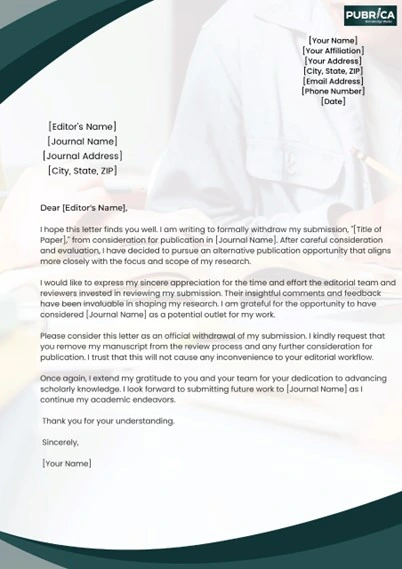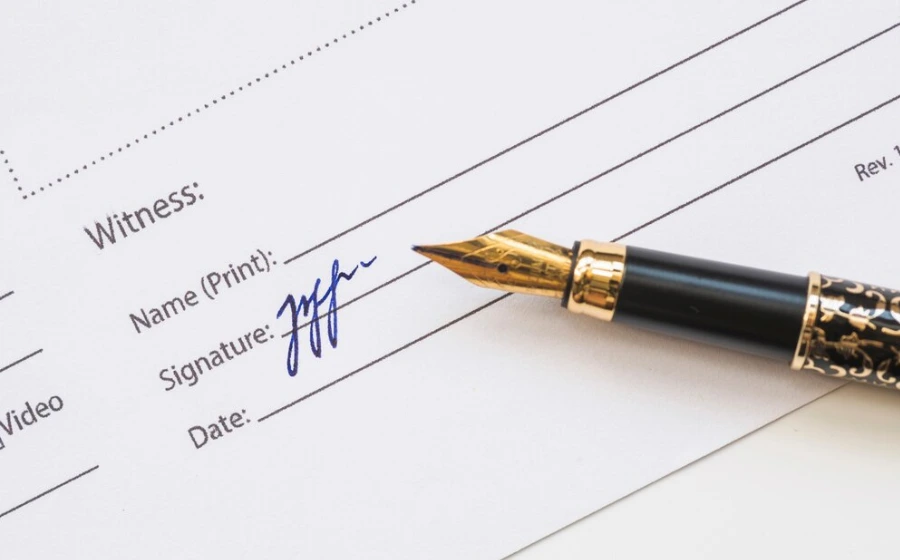
Inventions in Medical Therapeutics
February 1, 2024
Advanced Statistical Methods in Meta-Analysis
February 12, 2024Good Withdrawal Letter: A Guide for Journal Submissions
The Importance of a Well-Crafted Withdrawal Letter
It’s normal to face situations where you need to withdraw your submission when submitting work to journals. Whether it’s because your work has been accepted elsewhere, you’ve made revisions that significantly alter the content, or you have decided to pursue a different publication opportunity. In that case, the withdrawal process should be professional and considerate. Preparing a well-written withdrawal letter plays an important role in the process.
An effective withdrawal letter serves multiple purposes:
- It demonstrates your professionalism and respect for the journal and its editorial team.
- It provides clear communication between you and the journal, avoiding any potential confusion.
- It helps maintain positive relationships with the journal, which can be beneficial for future submissions.
While framing a withdrawal letter, it’s important to pay attention to the details. Start by addressing the letter to the appropriate editor or editorial team, using their preferred salutation. Express your gratitude for the time and consideration they have given to reviewing your work. Clearly state that you are withdrawing your submission and provide a brief explanation for your decision. This explanation can be as simple as indicating that the work has been accepted elsewhere or providing a concise reason for the withdrawal. [1]
Maintain a professional tone throughout the letter and avoid any negative remarks or criticism towards the journal or its process. Remember, the purpose of the withdrawal letter is to maintain positive relationships and leave a good impression.
When to Withdraw a Submission?
It is useful to acknowledge the appropriate time to retract your submission. Yes, it can be disheartening to withdraw a manuscript that you have put time and effort into; there are certain circumstances where it becomes necessary.
One common situation is receiving an acceptance from another journal. If your paper has been accepted elsewhere, you must withdraw your submission from those journals promptly. This will ensure transparency and integrity in the publishing process and allow the other journal to distribute its resources effectively.
Another scenario comes when you discover a significant error or flaw in your research or methodology. In such cases, withdrawing the submission is the right choice to avoid publishing misleading information. Taking responsibility for your work and maintaining the scientific community’s integrity should always be a priority.
If you find that the journal you submitted to is not the right fit for your research or if you receive multiple rejections or unfavorable reviews, it may be time to reconsider your submission. To increase your chances of success, carefully evaluate whether your work aligns with the journal’s scope and target audience.
Finally, suppose you need help to meet the journal’s requested revisions or deadlines. In that case, it’s better to withdraw your submission so that you can resubmit your work when you are confident that you can provide the necessary revisions within the given timeframe.
If you are seeking journal submission, give pubrica a shot. Pubrica: Where breakthroughs meet in the spotlight! Transform your research into published success with our top-notch journal submission services. Your discoveries, our dedication
How to Write an Effective Withdrawal Letter?
Whether you have decided to withdraw your submission due to acceptance elsewhere, revisions not deemed feasible, or a change in your research direction, you must communicate your withdrawal professionally and respectfully.
To begin, start your withdrawal letter with a polite salutation, addressing the editor or the designated person in charge. Mention the title of your manuscript and its submission date to provide context. Then, clearly state your intention to withdraw your submission. It is important to be concise and straightforward in your communication.
Next, briefly explain the reason for your withdrawal. While it is not mandatory to provide a detailed explanation, a brief and honest explanation can help maintain a positive relationship with the journal or editor. Avoid being overly critical or negative in your explanation.
Express your gratitude for the editor’s time and consideration in reviewing your manuscript. Acknowledge the effort and valuable feedback they may have provided during the review process. This shows your appreciation for their time and effort, even if you have decided to withdraw your submission. [2]
Finally, conclude your withdrawal letter with a polite closing, such as “Sincerely” or “Best regards.” Include your contact information, such as your email address or phone number, in case the editor needs to reach out to you for further clarification or follow-up.
Remember, maintaining professionalism and courtesy in your withdrawal letter makes the process uncomplicated. As a researcher, it can leave a positive impression, even if you decide to submit to the same journal in the future.
Feel free to modify and personalize this template according to your specific cases.
By approaching the withdrawal process professionally, you will uphold your reputation as a researcher and contribute to the overall integrity of the academic community. Remember that journals invest significant time and resources in reviewing and considering submissions, and they rely on authors to act responsibly and professionally. When crafting your withdrawal letter, be concise, clear, and courteous. Express your gratitude for the opportunity to submit your work and have it considered. Provide a brief explanation for your decision to withdraw without going into unnecessary detail. Remember, there is no need to apologize or justify your choice – state your decision respectfully.
Sample Withdrawal Letter Template
To guide you through this process, we have prepared a sample withdrawal letter template that you can use as a starting point:
Feel free to modify and personalize this template according to your specific cases.

By approaching the withdrawal process professionally, you will uphold your reputation as a researcher and contribute to the overall integrity of the academic community. Remember that journals invest significant time and resources in reviewing and considering submissions, and they rely on authors to act responsibly and professionally. When crafting your withdrawal letter, be concise, clear, and courteous. Express your gratitude for the opportunity to submit your work and have it considered. Provide a brief explanation for your decision to withdraw without going into unnecessary detail. Remember, there is no need to apologize or justify your choice – state your decision respectfully.
Accelerate your research impact with Pubrica’s end-to-end publication support! From accurate journal selection to flawless manuscript submission and adept handling of reviewer responses, we streamline your path to successful publication. Partner with Pubrica for a seamless journey from idea to impactful research dissemination.
Reference
1. Sereno, M. A., & DiCocco, J. (2023). Manuscript Submission. In Disseminating Behavioral Research (pp. 175-206). Cham: Springer Nature Switzerland.
2. Graff, G., Birkenstein, C., & Maxwell, C. (2014). They say, I say: The moves that matter in academic writing (p. 245). Gildan Audio.

14 years of expertise in clinical research with a doctoral distinction in life science.


